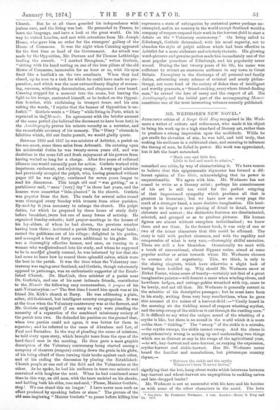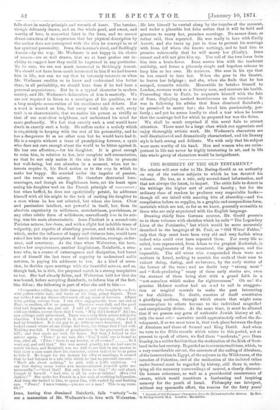MR. WEDMORE'S NEW NOVEL.*
J unictous critics of A &apt Gold Ring recognised in Mr. Wed- more a writer of culture and refinement, who made it his object-
to bring his work up to a high standard of literary art, rather than, to produce a strong impression upon the multitude. While he got credit for elevation of aim, he was told, and told truly, that seeking his audience in a cultivated class, and scorning to influence the throng of men, he failed in power. His work was appreciated,. but it left the heart untouched.
"Much care and little fire, Little to feel and much to admire,"
remarked one critic, by way of characterising it. We have reasoi. to believe that this epigrammatic rhymester has formed a dif-
ferent opinion of Two Girls, acknowledging that its power is. unquestionable. We agree with him. Mr. Wedmore has not ceased to write as a literary artist ; perhaps his consciousness.
of his art is still too vivid for the perfect outgoing of that impassioned sympathy which produces all that ie greatest in literature ; but we have now on every page the- mark of a stronger band, a more decisive imagination. His land- scape is no longer a mere piecing of detail to detail, however elaborate and correct ; the distinctive features are discriminated, aelected, and grouped so as to produce pictures. His human, figures are almost without exception individualised ; we know them and see them. In the former book, it was only of one or- two of the minor characters that this could be affirmed. The story is told with perfect clearness, and with the rapidity and compression of what is very rare,—thoroughly skilful narrative. There are still a few blemishes. Occasionally we meet with.
a touch of conventional, almost flippant satire, aimed at some popular author or artist towards whom Mr. Wedmore chooses to assume airs of superiority. This, we think, is only in the closing chapters, which have otherwise a slight look of having been huddled up. Why should Mr. Wedmore sneer at Birket Foster, whose sense of beauty—certainly not that of a great imaginative painter—will deserve a sneer when winding riven!, and hawthorn hedges, and cottage-gables wreathed with ivy, cease to- be lovely, and not till then. Mr. Wedmore is generally correct in the minntim of his descriptive passages; but he must have beeo in his study, writing from very hazy recollections, when he gave this account of the noises of a harvest-field :—" Cecily heard in the morning air the tinkling sound of reapers whetting scythes, and the crisp sweep of the sickle as it cat through the rustling corn." It is difficult to say what the unique sound of the whetting of a scythe is like, but there is no sound in the world which it is more unlike than "tinkling." The " sweep " of the sickle is a mistake, —the scythe sweeps, the sickle cannot sweep. And the clause in' comprehensively wrong in mixing up and confounding two things. which are as distinct as any in the range of the agricultural year, —to wit, hay-harvest and corn-harvest, or,varying the expression, scythe-harvest and sickle-harvest. Has Mr. Wedmore never heard the familiar and unmelodious, but picturesque country rhyme,—
" Between the sickle and the scythe Whatever's born '11 never thrive,"
signifying that the hot, hang-about weeks which intervene between hay-harvest and wheat-harvest are unpropitious to suckling calves and late-dropped lambs?
Mr. Wedmore is not so successful with his hero and his heroine as with some of the other characters in the novel. The hero
• Two Girls. By Frederick Wedmore. 2 Veil!. London: Henry S. Bing and Co. 1873.
falls short in manly principle and warmth of heart. The heroine, though delicately drawn, and on the whole good, and sweet, and worthy of love, is somewhat faint in the lines, and we cannot
divest ourselves of tbe impression that her physical description by the author does not correspond with the idea he conveyi-to us of
foes spiritual personality. Irma, the heroine's rival, and Beddingly Aucott—by the way, Mr. Wedmore is not happy in his choice of names—are so well drawn, that we at least profess our in- ability to suggest how they could be improved in any particular.
To be sure, we are not much interested in Beddingly Aucott. We should not have been much interested in him if we had known
him in life, nor can we say that he iutensely interests us when Mr. Wedmore enables us to know and nuderstand him better than, in all probability, we should have done if he had been a personal acquaintance. But he is a typical character in modern society, and Mr. Wedmore's delineation of him is masterly. We are not required to listen to a catalogue of his qualities, or to a long analytic enumeration ef his excellences and defects. Not a word is wasted on bim, but every word tells so well, every trait is so characteristic, that we realise his person as vividly as that of our next-door neighbour, and understand his mind far more profoundly. We feel that exactly such a soul would have dwelt in exactly such a body. He suffers under a malady which is exquisitely in keeping with the rest of his personality, and he has a dangerous fit as no other man but be would have had it.
He is a sceptic without a trace of proselytising fervour, a cynic who does not care enough about the world to be bitter against it. He has one affection,—for his daughter. It is great enough to raise him, in relation to her, into complete self-renunciation, so that be not only makes it the aim of his life to promote her well-being, but can abandon in a moment, when her in-
terests require it, his fixed notion as to the way in which to
make her happy. He married under the impulse of passion, and the result was misery. He therefore distrusted love-
marriages, and though an Englishman born, set his heart upon seeing his daughter wed on the French principle of convenance ; but when baffled, he does not egotistically persist, he addresses himself with all his might to the task of uniting his daughter to a man whom he has not selected, but whom she loves. Clear and passionless intellect, not powerful in itself, but, from its absolute superiority to wilfulness, crotchettiness, peevishness, or any other subtle form of selfishness, marvellously true in its act-
ing, was his main characteristic. Irma Flaubert is a second-rate Parisian actress, low-born, and with a slight but indelible trace of vulgarity, yet capable of absorbing passion, and with that in her which, under the influence of happy and virtuous love, would have raised her into the atmosphere of heroic devotion, courage, endur- ance, and constancy. At the time when Welverton, the hero, makes her acquaintance, another Englishman, Rainforth, a crea- ture who, in a course of extravagance and dissipation, had burnt out of himself the last trace of capacity to understand noble natures, is paying his addresses to her. As a kind of sensa- tion, he decides upon marriage with the beautiful actrtss, and as, though bad, he is rich, the proposed match is a strong temptation to her. She had already fallen, and 1Velverton told her that she was bound, before accepting Rainforth, to inform him of the fact. She did so ; the following is part of what she said to him :-
"I remember selling my little time-piece. and who bought it,—a Jew, with yellow-white hair, and warts on his long, grimy fingers. Then my table ; I ate my dinner afterwards off my chest of drawers. Affairs wore getting serious then. I ran after engagements from one end of Paris to another, all to no purpose. Theatres were dull, and the good God had forgotten me, you see. I sold all my chairs except one. I sold my clothes, except those that I wore. ' Why did I do that ?' Ah ! no, you perhaps can't understand. There was a very little mirror left in the chamber. I looked at myself in it, one winter's morning, when I had had no b-eakfast. It is not gay to go without one's breakfast. And I looked round whore all my things had boon, the things that I bad sold. Nothing was left. I thought of grandmother in the graveyard on the hill ; and that made me wait, for hours. But then I looked in the mirror again. Tiens ! je me suis dit ; 'Yes.' I said,' one is bound to live, after all. Tiens! there is my beauty, at all events!' So I went out, and sold that." Sho was moved greatly, yet she had care to watch his face, and Rainforth was too dull to see that in any answer to that story a man must show his character, unless indeed he be at pains to hide it. Ho forgot for the instant his offer of marriage, it seemed that ho had listened to a tale with which ho had no personal concern.— " Much ado about nothing," he said, with a fool's cynicism. "I say that during many weeks you inconvenienced yourself quite un- necessarily."—" Good God! But only listen to him !" she said aloud, though to herself. "And this is all he says or thinks ! Main c'est infdine ! " She spoke her French in a low tone of seething indignation. And then she turned to him, to spurn him, with curled lip and flashing eye. " Tenez! I am a woman,—you are not a man! This is my room. Go !"
Irma, having thus dismissed Rainfortb, falls "utterly "—to •Le9ends of Old Testament Characters, from the Talmud and other Sources. use a mannerism of Mr. Wedmore's—in love with Welverton. s.Barius-Ooata, MA. London: Macmillan
He lets himself be carried along by the impulse of the moment, and under a plausible but false notion that it will be bold and generous to marry her, promises marriage. No sooner done, or rather said, than repented. He was really in love with Cecily Aucott and she turns up just in time to prevent his marriage with Irma (of whom she knows nothing), and to lead him to promise vehemently that he will marry her (Cecily). Irma cannot and will not give him up. The coil of the two loves frets him into a brain-fever. Irma nurses him with the tenderest assiduity, and forms a piteously simple and hopeless scheme to keep him as her own. He recovers. She sees in bis eye that he has ceased to love her. 1Then she goes to the theatre, he leaves her lodgings ; and she, when she finds that he has escaped, commits suicide. Meanwhile he betakes himself to London, resumes work as a literary man, and recovers his health. Proceeding then to Paris, he acquaints himself with the fate of Irina, displaying marked heartlessness on the occasion. It was in following his advice that Irma dismissed Rainforth ; he promised to marry her ; she loved him passionately, per- fectly; and yet he seems hardly to shed a tear when he learns that the marriage-bed for which he prepared her was the Seine.
We shall be much surprised if this novel fails to attract attention. There must be a large class which can appreciate and enjoy thoroughly artistic work. Mr. Wedmore's characters are well discriminated and dramatically characterised, and his literary style is both strong and delicate. We wish only that his subject were more worthy of his band. Men and women who are unim- portant in life can never be highly interesting in art, and in life this whole group of characters would be insignificant.



































 Previous page
Previous page